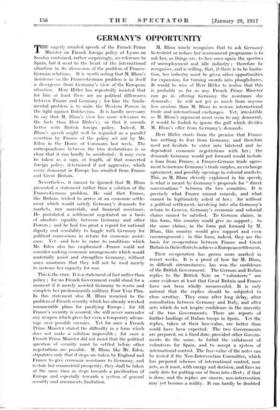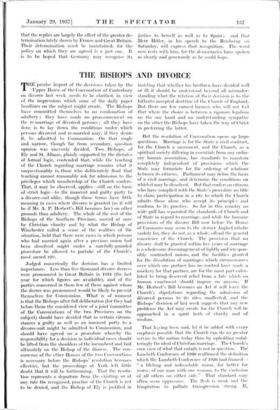GERMANY'S OPPORTUNITY
THE eagerly awaited speech of the French Prime Minister on French foreign policy at Lyons on Sunday contained, rather surprisingly, no reference to Spain, but it went to the heart of the international situation in its discussion of the problem of Franco- German relations. It is worth noting that M. Blum's insistence on the Franco-German problem is in itself a divergence from Germany's view of the European situation. Herr Hitler has repeatedly insisted that for him at least there are no political differences between France and Germany ; for him the funda- mental problem is to unite the Western Powers in the fight against Bolshevism. It is hardly necessary to say that M. Blum's view has more relevance to the facts than Herr Hitler's ; or that it accords better with British foreign policy. Indeed, M. Blum's speech might well be regarded as a parallel assertion by France of the policy set out by Mr. Eden in the House of Commons last week. The correspondence between the two declarations is so clear that it can hardly be accidental ; it may even be taken as a sign, at length, of that concerted foreign policy, determined if not aggressive, which every democrat in Europe has awaited from France and Great Britain.
Nevertheless, it cannot be ignored that M. Blum presented a statement rather than a solution of the Franco-German problem. He said that France, like Britain, wished to arrive at an economic settle- ment which would satisfy Germany's demands for markets, raw materials, and financial assistance. He postulated a settlement negotiated on a basis of absolute equality between Germany and other Powers ; and he had too great a regard for national dignity and sensibility to haggle with Germany for political concessions in return for economic assist- ance. Yet—and here lie came to conditions which Mr. Eden also has emphasised—France could not consider making economic arrangements which would materially assist and strengthen Germany, without sonic assurance that they will not be used merely to increase her capacity for war.
This is the crux. It is a statement of fact rather than• policy ; for no French Government could stand for a moment if it merely assisted Germany to rearm and complete her predominantly military Four Year Plan. In this statement also M. Blum recurred to the problem of French security which has already wrecked innumerable plans for pacifying Europe ; for till France's security is assured, she will never surrender any weapon which gives her even a temporary advan- tage over possible enemies. Yet for once a French Prime Minister stated the difficulty in a form which does not make a solution impossible ; for once a French Prime Minister did not insist that the political question of security must be settled before other .negotiations arc possible. M. Blum, like• Mr. Eden, stipulates only that if steps arc taken by England and France to give economic assistance to Germany, and restore her commercial prosperity, they shall be taken at the same time as steps towards a pacification of Europe and especially towards a system of general security and armaments limitation. M. Blum wisely recognises that to ask Germany to restrict or reduce her rearmament programme is to ask her, as things are, to face once again the spectres of unemployment and idle industry ; therefore he recognises, and is willing, that, if there is to be limita- tion, her industry must be given other opportunities for expansion, for turning swords into ploughshares.- It would be wise of Herr Hitler to realise that this is probably as far as any French Prime Minister can go in offering Germany the assistance she demands ; he will not get as much from anyone less anxious than M. Blum to restore international trade and international exchanges. Yet, irresistible as M. Blum's argument must seem to any democrat, it would be foolish to ignore the gulf which divides M. Blum's offer from Germany's demands.
Herr Hitler starts from the premise that France has nothing to fear from Germany, and therefore need not hesitate to enter into bilateral and in- dependent economic negotiations with her ; the demands Germany would put forward would include a loan from France, a Franco-German trade agree ment to increase Germany's trade surplus, an exchange agreement, and possibly openings in colonial markets. This, as M. Blum cleverly explained in his speech, is what is meant by Germany's proposals for " direct conversations " between the two countries. It is precisely what France cannot concede, and what cannot be legitimately asked of her ; for without a political settlement, involving inter alia Germany's return to Geneva, Germany's economic and colonial claims cannot be satisfied. To German claims, in this form, this country could give no support ; to the same claims, in the form put forward by M. Blum, this country would give support and even encouragement ; in this form, indeed, they arc the basis for co-operation between France and Great Britain in their efforts to achieve a European settlement.
Their co-operation has grown more marked in recent weeks. It is a proof of how far M. Blum, in difficult circumstances, has won the confidence of the British Government. The German and Italian replies to the British Note on " volunteers " are some evidence at least that Great Britain and Fraiice have not been wholly unsuccessful.' It is only natural that the replies should be subjected to close scrutiny. They come after long delay, after consultation between Germany and Italy, and after acts which do not inspire confidence in the sincerity of the two Governments. There are reports of further landings of Italian troops in Spain. Yet the replies, taken at their face-value, are better than could have been expected. The two Governments are prepared, on a fixed date, provided other Govern- ments do the same, to forbid the enlistment of volunteers for Spain, and to accept a system of international control. The face-value of the notes can be tested if the Non-Intervention Committee, which has prepared schemes of international control, now acts, as it must, with energy and decision, and fixes an early date for putting one of them into effect ; if that is done, and the replies are sincere, non-intervention may yet become a reality. It can hardly be doubted that the replies are largely the effect of the greater de- termination lately shown by France 'and Great Britain. Their determination must be maintained, for the policy on which they are agreed is a just one. It is to be hoped that Germany may recognise its justice to herself as well as to Spain ; and that Herr Hitler, in his speech to the Reichstag on Saturday, will express that recognition. The word now rests with him, for the democracies have spoken as clearly and generously as he could hope.























































 Previous page
Previous page